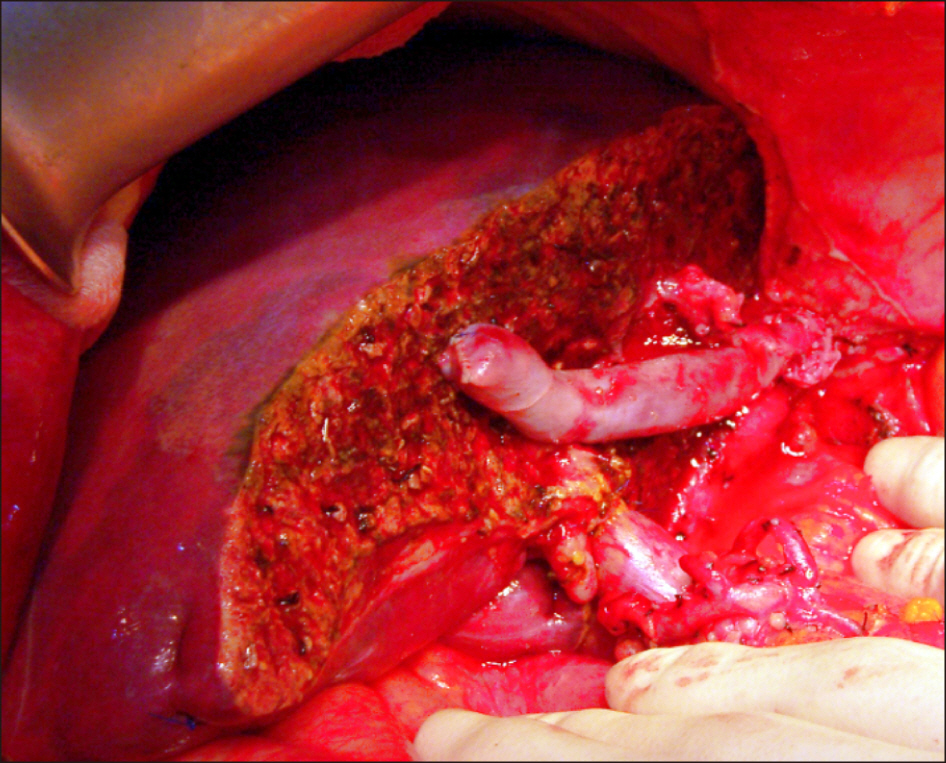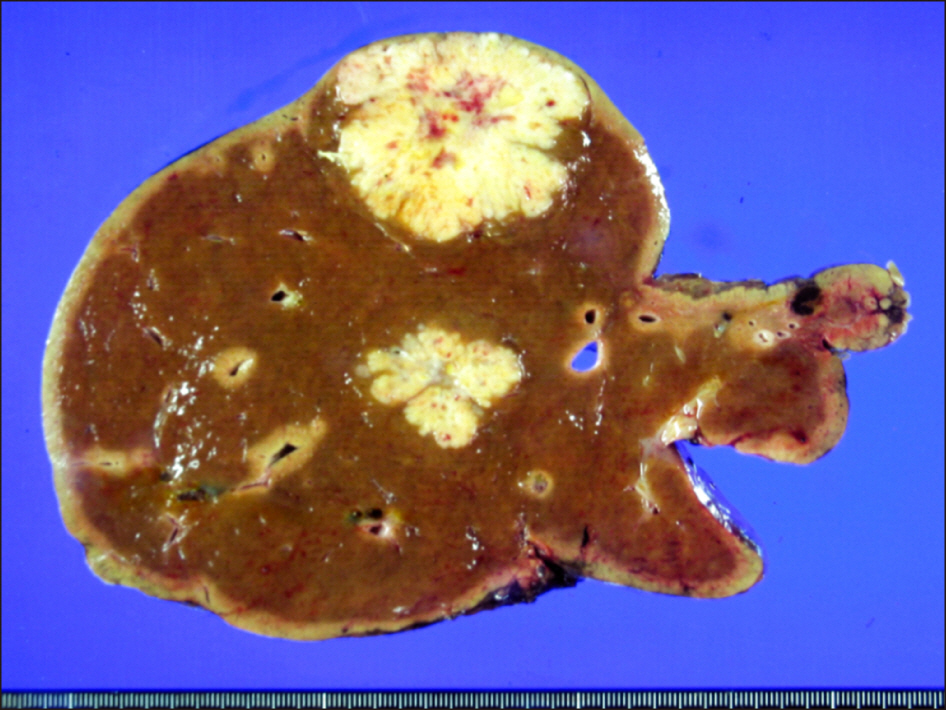Ann Hepatobiliary Pancreat Surg.
2020 May;24(2):188-191. 10.14701/ahbps.2020.24.2.188.
Living donor liver transplantation for unresectable colorectal liver metastasis: Report of a case with 13-year follow-up without recurrence
- Affiliations
-
- 1Division of Hepatobiliary Surgery and Liver Transplantation, Department of Surgery, Asan Medical Center, University of Ulsan College of Medicine, Seoul, Korea
- KMID: 2500804
- DOI: http://doi.org/10.14701/ahbps.2020.24.2.188
Abstract
- The feasibility of liver transplantation (LT) for colorectal liver metastasis (CRLM) is still under investigation with only a limited number of LT cases in literature. CRLM is the most common type of liver metastasis, but it was considered as a contraindication to LT for a long time because of poor outcomes. We presented a case of living donor liver transplantation (LDLT) performed in a patient with liver cirrhosis and CRLM. The patient was a 49-year-old female with sigmoid colon cancer and synchronous multiple CRLM. She underwent anterior resection for sigmoid colon cancer and 7 sessions of chemotherapy for CRLM. She suffered from esophageal varix bleeding due to chemotherapy-associated liver cirrhosis. Because of liver cirrhosis and multiple CRLM, the patient underwent LDLT operation using a modified right lobe graft. Serum chorioembryonic antigen level was 220 ng/mL at LT. Explant liver pathology showed multiple metastatic adenocarcinomas of colonic origin, up to 4.7 cm in the greatest dimension. The patient did not receive any specific anti-tumor treatment after LT. She is doing well without any tumor recurrence to date for more than 13 years after the LDLT operation. The experience on our case and literature review suggest that CRLM is not always contraindicated for LT because some selected patients showed improved long-term survival outcomes.
Figure
Reference
-
1. Hoti E, Adam R. 2008; Liver transplantation for primary and metastatic liver cancers. Transpl Int. 21:1107–1117. DOI: 10.1111/j.1432-2277.2008.00735.x. PMID: 18713148.
Article2. Simoneau E, D'Angelica M, Halazun KJ. 2019; Liver transplantation for colorectal liver metastasis. Curr Opin Organ Transplant. 24:175–181. DOI: 10.1097/MOT.0000000000000623. PMID: 30839338.
Article3. Gorgen A, Muaddi H, Zhang W, McGilvray I, Gallinger S, Sapisochin G. 2018; The new era of transplant oncology: liver transplantation for nonresectable colorectal cancer liver metastases. Can J Gastroenterol Hepatol. 2018:9531925. DOI: 10.1155/2018/9531925. PMID: 29623268. PMCID: PMC5829429.
Article4. Mühlbacher F, Huk I, Steininger R, Gnant M, Götzinger P, Wamser P, et al. 1991; Is orthotopic liver transplantation a feasible treatment for secondary cancer of the liver? Transplant Proc. 23(1 Pt 2):1567–1568. PMID: 1989293.5. Hagness M, Foss A, Egge TS, Dueland S. 2014; Patterns of recurrence after liver transplantation for nonresectable liver metastases from colorectal cancer. Ann Surg Oncol. 21:1323–1329. DOI: 10.1245/s10434-013-3449-9. PMID: 24370906. PMCID: PMC3942624.
Article6. Toso C, Pinto Marques H, Andres A, Castro Sousa F, Adam R, Kalil A, et al. Compagnons Hépato-Biliaires Group. 2017; Liver transplantation for colorectal liver metastasis: survival without recurrence can be achieved. Liver Transpl. 23:1073–1076. DOI: 10.1002/lt.24791. PMID: 28544246.
Article7. Dueland S, Guren TK, Hagness M, Glimelius B, Line PD, Pfeiffer P, et al. 2015; Chemotherapy or liver transplantation for nonresectable liver metastases from colorectal cancer? Ann Surg. 261:956–960. DOI: 10.1097/SLA.0000000000000786. PMID: 24950280.
Article8. Dueland S, Foss A, Solheim JM, Hagness M, Line PD. 2018; Survival following liver transplantation for liver-only colorectal metastases compared with hepatocellular carcinoma. Br J Surg. 105:736–742. DOI: 10.1002/bjs.10769. PMID: 29532908.
Article9. DʼAngelica MI, Correa-Gallego C, Paty PB, Cercek A, Gewirtz AN, Chou JF, et al. 2015; Phase II trial of hepatic artery infusional and systemic chemotherapy for patients with unresectable hepatic metastases from colorectal cancer: conversion to resection and long-term outcomes. Ann Surg. 261:353–360. DOI: 10.1097/SLA.0000000000000614. PMID: 24646562. PMCID: PMC4578807.10. Kemeny NE, Niedzwiecki D, Hollis DR, Lenz HJ, Warren RS, Naughton MJ, et al. 2006; Hepatic arterial infusion versus systemic therapy for hepatic metastases from colorectal cancer: a randomized trial of efficacy, quality of life, and molecular markers (CALGB 9481). J Clin Oncol. 24:1395–1403. DOI: 10.1200/JCO.2005.03.8166. PMID: 16505413.
Article11. Clavien PA, Selzner N, Morse M, Selzner M, Paulson E. 2002; Downstaging of hepatocellular carcinoma and liver metastases from colorectal cancer by selective intra-arterial chemotherapy. Surgery. 131:433–442. DOI: 10.1067/msy.2002.122374. PMID: 11935134.
Article12. Fernandes ESM, Line PD, Mello FP, Andrade RO, Girão CL, Pimentel LS, et al. 2019; Living donor liver transplant for colorectal liver metastasis: the first case in Latin America. Arq Bras Cir Dig. 32:e1468. DOI: 10.1590/0102-672020180001e1468. PMID: 31859921. PMCID: PMC6918729.
Article
- Full Text Links
- Actions
-
Cited
- CITED
-
- Close
- Share
- Similar articles
-
- A Case of Living Donor Liver Transplantation for Unresectable Hepatoblastoma
- Liver retransplantation for adult recipients
- Left at right heterotopic implantation of left liver graft in adult-to-adult living donor liver transplantation: the technical concern for decision-making
- Indication and Outcome of Liver Transplantation In Patients with Hepatocellular Carcinoma
- Portal vein fenestration: a case report of an unusual portal vein developmental anomaly





